With the ever-growing presence of online threats and hackers, preserving your personal information and concealing your IP address while browsing is vital. VPN services like NordVPN and PIA definitely know that, keeping in mind they’re some of the most secure providers you can get.
This, along with many other reasons, makes choosing between the two providers incredibly hard, which is why users online are looking for a Private Internet Access vs NordVPN comparison in 2025. Both providers are excellent, that much I can tell you, but there are some minor AND major differences between the two.
Believe me – despite being an American VPN, Private Internet Access is surprisingly good, and above all, safe and secure. Wondering how well it compared to a giant like NordVPN? Well, I’m interested as well, and so I made this NordVPN vs Private Internet Access comparison for all of you.
I’m going to compare all of their aspects, ranging from ease of use and device support to streaming, performance, torrenting, and much more. Without wasting another second of your time, let’s jump straight to the comparison.
PIA vs NordVPN: Apps & Ease of Use
My PIA vs NordVPN duel will start with the comparison of apps and ease of use. When it comes to app support, both providers are incredible, although PIA seems to be lacking at first. Namely, if you check “Apps” on its site, you won’t see routers or Fire TV Stick.
However, upon checking out its website further, I found that it does have a native VPN app for Fire TV Stick, as well as solid router support. In addition, it offers Smart DNS for using it on gaming consoles, and the same could be said about NordVPN.
NordVPN offers the same great device compatibility with native clients for all VPN-capable devices. In addition, this provider has better router support, which is great, but it has fewer simultaneous connections, where PIA takes the lead.
NordVPN has 6 of them while Private Internet Access offers unlimited simultaneous connections on a single account. Needless to say, PIA VPN is definitely better for users with more than a few devices. NordVPN is, sadly, a bit disappointing in this regard.
Private Internet Access
Let’s see how good these providers are in terms of ease of use. At first, PIA offers this minimalistic app that is as simple as it gets. You get the connection button in the middle and clicking once on it connects you to a country below it.
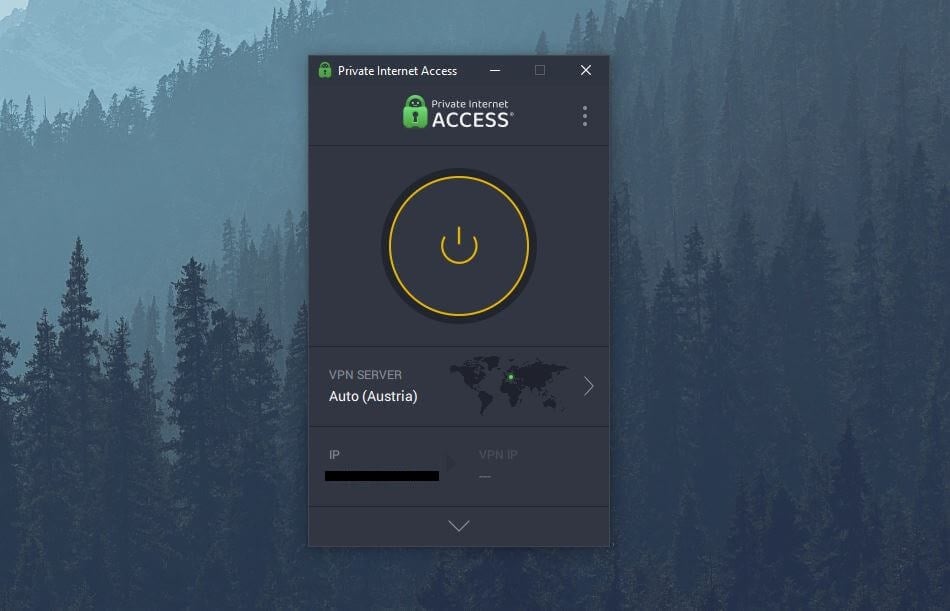
To open the server list, you need to click on the arrow next to the country, where the entire list unwraps below, increasing the size of the window vertically – I never liked that. Nevertheless, one click on the country connects you to a server located there.
In the Settings menu, we can see that Private Internet Access is well-equipped with features. In spite of feature-richness, every feature has its own menu, so we can find separate menus for protocol selection, dedicated IP, split tunneling, Multi-Hop, etc, etc.
I found everything to have logic in PIA VPN and if you’re a newcomer, I doubt you’ll have any issues getting used to it. Back to the server list, this provider shows you the ping of each server in milliseconds and you can add any server you like to the “Favorites” list.
Confusingly, servers are listed according to their ping, from the lowest to the highest. This creates confusion and makes it difficult to find the server you want. I definitely prefer having servers listed in an A-Z manner, as is the case with ExpressVPN, CyberGhost, or even NordVPN.
The same could be said about its mobile app, but to be honest, I like it more. It doesn’t have a window that shrinks and extends and everything is a bit smoother. The desktop app, for some reason, isn’t very smooth and everything I do has that annoying delay, especially between animations.
NordVPN
In this Private Internet Access vs NordVPN duel, I think that NordVPN did a better job with its apps. Both mobile and desktop apps are way better, and might I add, better-looking as well! Not to mention that NordVPN’s app is buttery-smooth and takes one click to connect to a server of your choice.
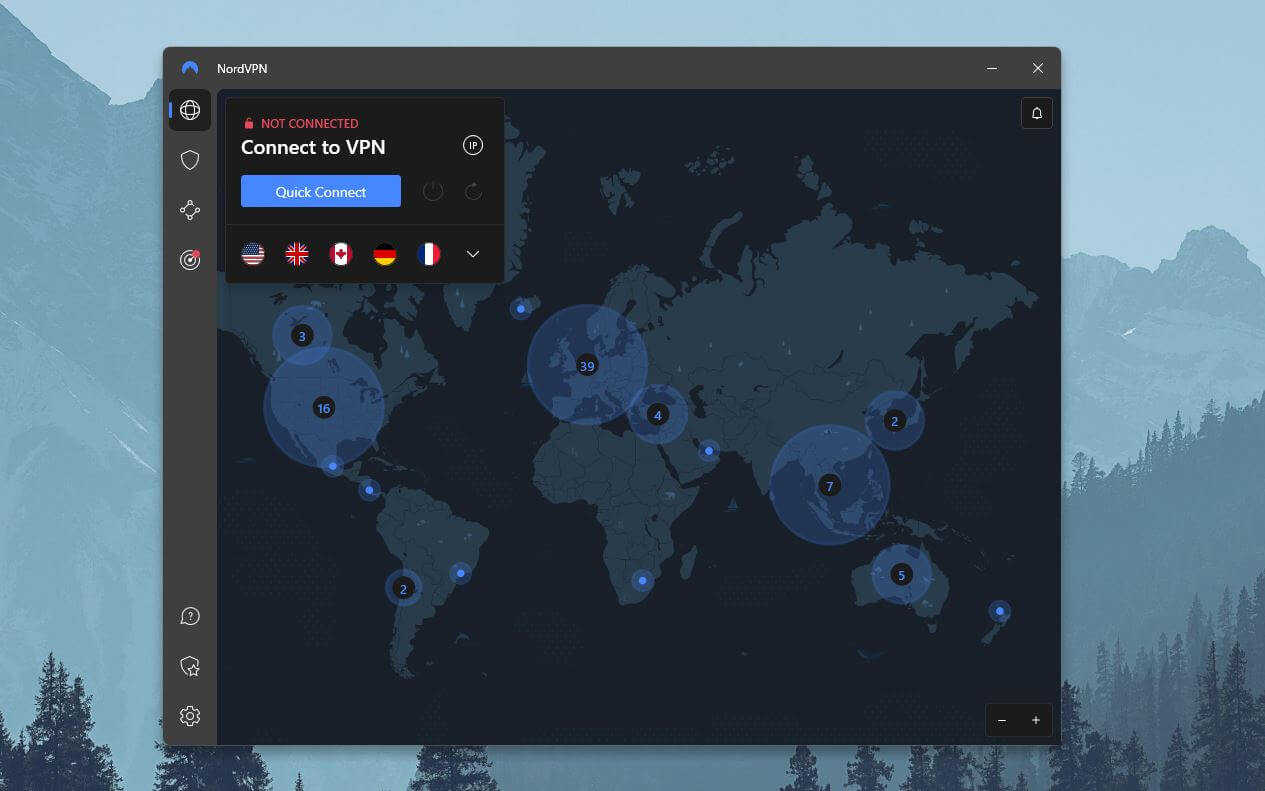
Its world map is high-res too and it, as well, can be used to connect. On the left side of the screen, you’ll find features like Threat Protection, Meshnet, Dark Web Monitor, Security Score, and Settings. I like that you get separate menus for those important features.
The Settings menu follows a similar path, as NordVPN simplified its app to the point of being idiot-proof. In the General menu, you can change the appearance and behavior of the app, while all other important settings have their menus.
Kill switch, split tunneling, and connection options are all in different menus here. In the Connection menu, you can change your protocol, and the kill switch menu allows you to enable or disable the app and internet kill switch.
Once again, servers are listed from A to Z here and specialty servers are right above the server list for added intuitiveness. You can even search for the server location you want, which makes things easier if you hate scrolling down the server list.
All in all, I think NordVPN did a MUCH better job with its apps on desktop and mobile platforms. PIA’s interface is outdated and I think its team should focus on making the user experience better.
Who Wins?
In this part of the PIA vs NordVPN duel, it’s a DRAW. While Private Internet Access offers more simultaneous connections, NordVPN offers more functional apps that result in a better user experience.
Security & Privacy: Which One Is Safer to Use?
Having in mind that we’re talking about some of the most secure VPNs on the planet, this part of this NordVPN vs PIA VPN duel is going to be interesting. Which one is more secure? Well, read on to find out.
Security Features
Since VPNs all function the same, it’s logical that some of their features will be similar. In my Private Internet Access review, I highlighted its features, but let’s see which ones it shares with NordVPN.
256-bit AES encryption is used by both VPNs, as well as typical features like a kill switch, split tunneling, and IP/DNS leak protection. NordVPN offers Double VPN while PIA has Multi-Hop and these are the same features aimed at doubling your encryption.
With PIA, however, you can choose through which servers to route your traffic, while NordVPN gives you pre-defined pairs. Moreover, NordVPN has CyberSec, which is an ad blocker, and Private Internet Access has MACE – exactly the same feature with a different name.
It’s also worth mentioning that both VPN providers offer dedicated IP addresses and both of them support OpenVPN. Besides, both VPNs have their private DNS, which adds greatly to the level of privacy and security that both providers can be proud of.
What Are the Differences?
Comparing any VPN to NordVPN makes you think this provider is somewhat unique due to the combination of features it has – and it is. NordVPN, aside from everything I said, offers Threat Protection where you can find malware protection and antivirus, along with CyberSec.
Then, you have Meshnet, which I found useful for hosting secure LAN parties both when gaming and collaborating with my colleagues and friends. Dark Web Monitor is also an awesome feature, telling you if your sensitive data is exposed online publicly, which allows you to take immediate action. Feel free to read my NordVPN review to get more information about these features.
Moving on, NordVPN has this NordLynx protocol and it’s unique because it’s made by this provider. Although it’s based on WireGuard, the provider tweaked it additionally to make it not only faster but also significantly more secure.
Split tunneling works differently as well. NordVPN can block apps from using a VPN tunnel while PIA can do that even for IP addresses (websites). Additionally, Private Internet Access uses WireGuard protocol aside from OpenVPN and it lets you choose from multiple DNS servers.
Moreover, there’s this Automation menu, that lets you create custom rules when connecting or disconnecting from a VPN server. Not to mention a heap of advanced features that let you choose the level of encryption, local port, MTU (packet size), remote port, and configuration method.
With Private Internet Access, you can even choose from two types of proxies – Shadowsocks and SOCKS5 for added customization. Simply put, NordVPN is more “plug & play” while PIA lets you play around with advanced settings if you know what you’re doing.
Is There a No-Logs Policy?
Yes, in this PIA vs NordVPN comparison, you can expect both providers to have a no-logging policy. Interestingly, Private Internet Access is based in the USA, a founding member of the 5 Eyes alliance known for constant surveillance and monitoring of user activities.
NordVPN, on the other hand, resides in Panama and this jurisdiction is significantly better for privacy. After all, there’s a good reason behind many CEOs opening their companies in this country. This makes you think that Private Internet Access is worthless and doesn’t care about your privacy.
However, that couldn’t be further from the truth. So far, PIA stayed true to its promises and never stored or given out any user information, even when forced to do so, which serves as a “personal audit” if that could be a phrase.
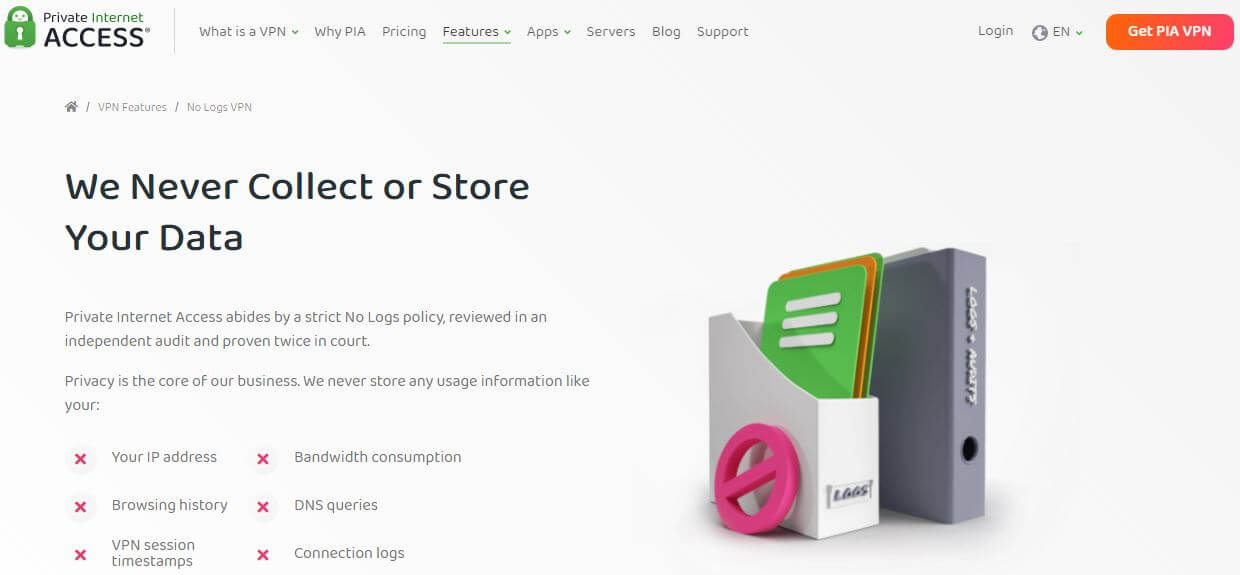
This provider stores no logs of your IP address, browsing history, VPN session timestamps, bandwidth consumption, connection logs, or DNS queries. Private Internet Access proved its no-logging practices in court, as it always came out empty-handed.
Plus, Deloitte, one of the biggest auditors, conducted a full scan and test of PIA’s infrastructure, after which, it received an audit from this company, proving all of PIA’s claims. NordVPN is already a well-known no-log VPN provider and we have nothing special to talk about here.
It has two security audits from PricewaterhouseCoopers and stores absolutely no logs of your IP address, browsing history, geolocation, timestamps, and other suspicious information. This provider also uses RAM-based servers that serve as another privacy measure.
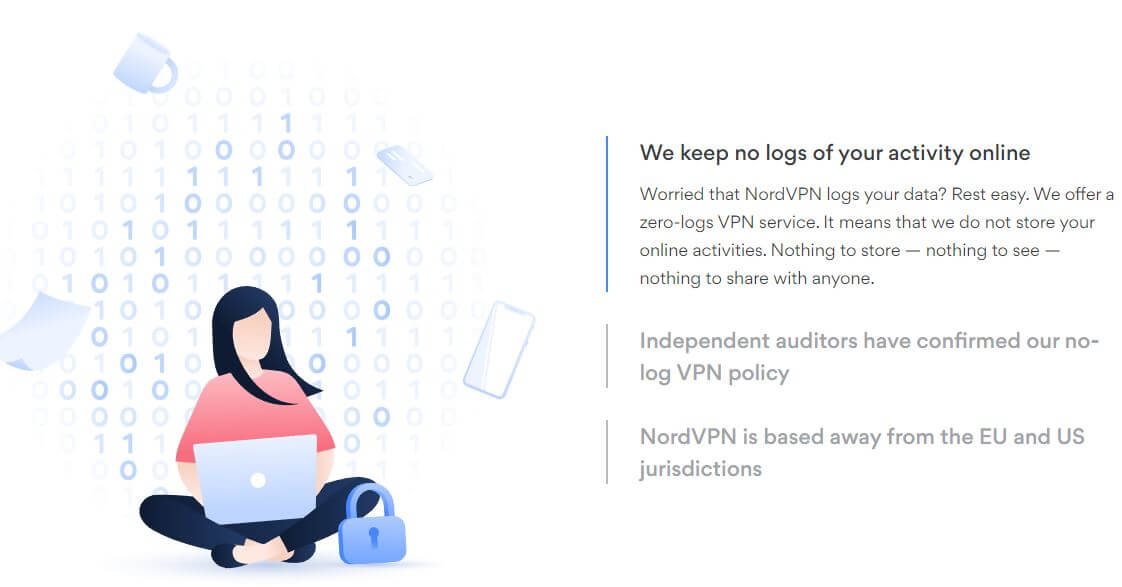
In simple words, every bit of information is wiped from the server after its restart, preventing anyone from accessing it. The information that these providers store is benign and has to do with technical data that helps both providers maintain and upgrade their services.
Who Wins?
After an extensive NordVPN vs PIA test of privacy and security, one thing is sure – this round is a DRAW as both providers show exceptional security features with a heavy accent on privacy thanks to their verified no-logging policies.
Private Internet Access vs NordVPN: Streaming Test
So far, the score is 2:2 and it’s interesting to see how NordVPN and Private Internet Access will compare in my streaming test. While NordVPN is famous for its great streaming capabilities, its rival always lacked in this regard. It’ll be interesting to see if any improvements have been made.
Netflix Test
Let me start with Netflix. This PIA VPN vs NordVPN duel will tell you how well these providers work with Netflix and its libraries. To make sure the test is fair, I’ll use three popular libraries like Netflix US, Japan, and Canada.
Furthermore, you should know that I’m located in Eastern Europe, so I have no native access to any of these libraries. This means that I need to use a VPN to watch Prime Video and Netflix anyway, making it suitable to test these providers along the way, starting with PIA.
Private Internet Access failed to unblock Netflix Japan and USA, while NordVPN worked well with all three libraries.
Other Streaming Platforms
When talking about other streaming platforms, we usually test Hotstar and BBC iPlayer because they’re free, yet, they pose enough of a challenge to see how well the two VPNs function in terms of streaming.
The good news is that I managed to unblock Hotstar outside of India with PIA, while BBC iPlayer couldn’t be unblocked while using it. On the other hand, NordVPN works only with BBC iPlayer as it has no servers in India.
Who Wins?
Even though NordVPN isn’t working with Hotstar, it still beats PIA when it comes to Netflix, as it’s capable of unblocking more libraries than this provider. To conclude, NordVPN WINS this round of comparison.
NordVPN vs PIA Speed Comparison: Which One Is Faster?
This part of the PIA VPN vs NordVPN comparison for 2025 will tell you how fast these services are. However, to make sure I have everything in place, I should first tell you about the testing parameters that are vital for this type of test.
First, let’s talk about server selection. I set this to Automatic in both providers to make sure the test is fair. Moreover, I tested both providers for 3 days in a row, 3 times a day, using 4 server locations in the US, the UK, Australia, and Japan.
Bear in mind that I’m in Eastern Europe, so I used a mix of locations that are close to me (the UK) and far from me (the US, Australia, and Japan). Before I show you the performance of both providers, let me first give you a screenshot of my native internet speeds:
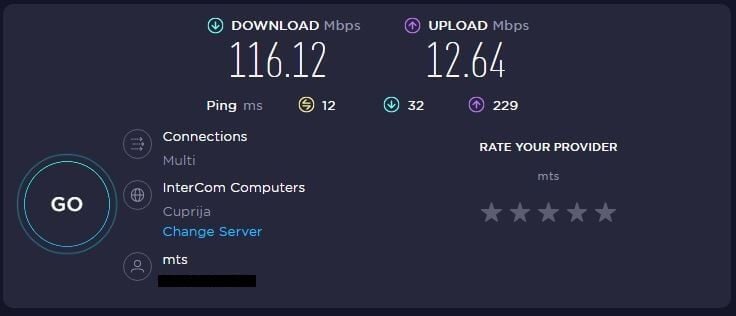
With that out of the way, let’s see which VPN is faster in this comparison.
Private Internet Access
UK:
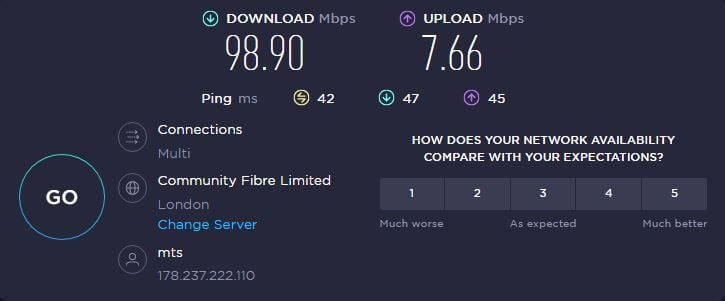
US:
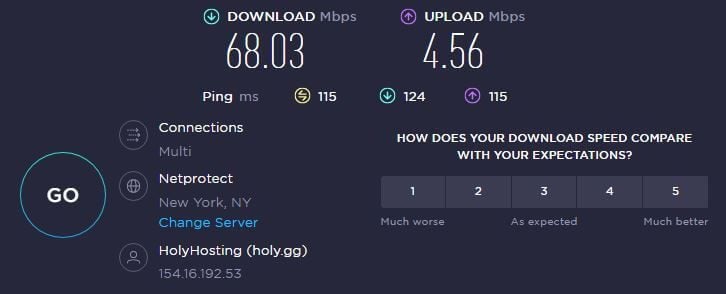
Australia:
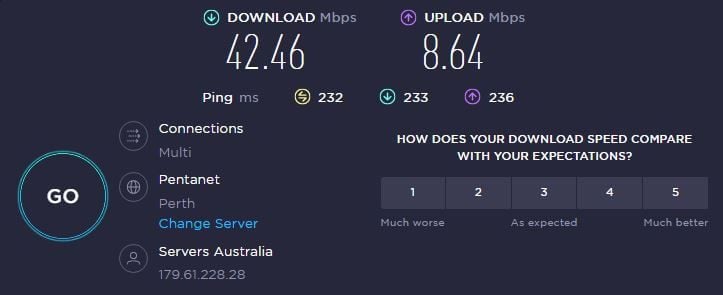
Japan:
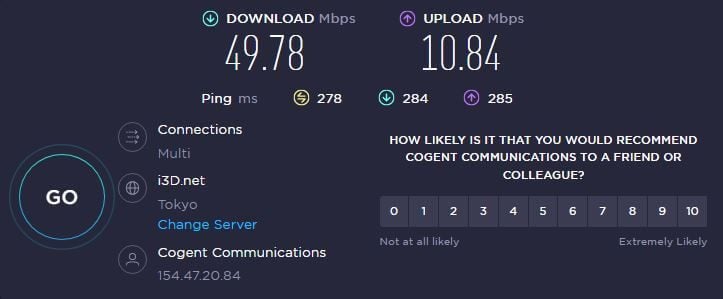
NordVPN
UK:
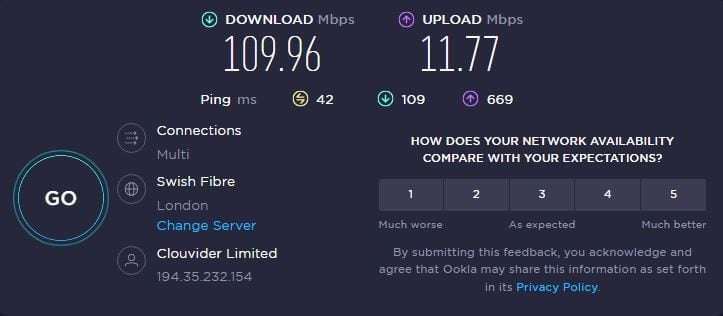
US:
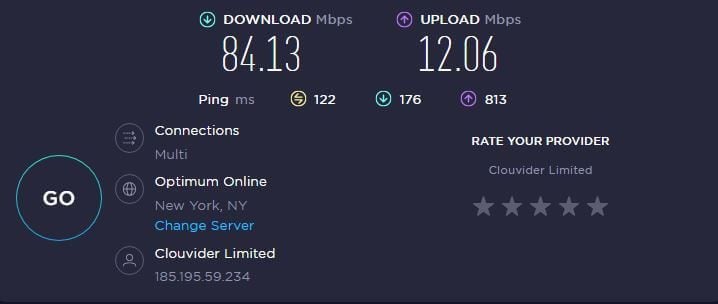
Australia:
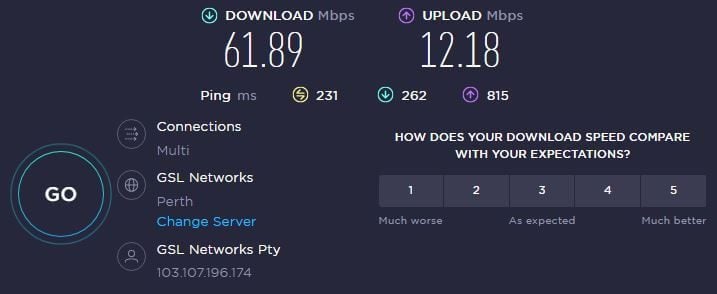
Japan:
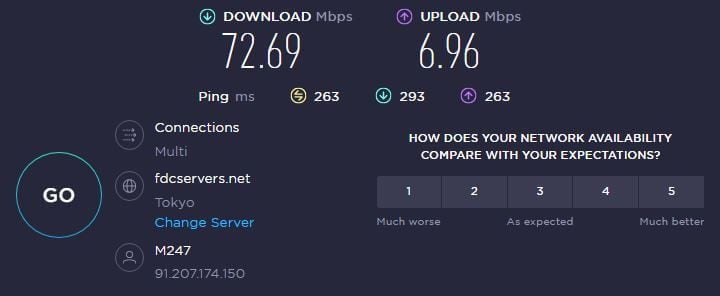
Who Wins?
It’s clear that in this PIA vs NordVPN comparison, NordVPN WINS, as it’s faster in every scenario, both when using closer and more distant servers.
Torrenting: Are PIA and NordVPN P2P-Friendly?
Torrenting requires a safe and secure provider with strong encryption and a no-logging policy. The same could be said about crypto trading where a VPN can protect your privacy. For torrenting, however, we also want a VPN to be fast and reliable for quicker downloads.
How well do these two stack against each other? Fortunately, very well.
NordVPN offers dedicated P2P servers that you can use to maximize your privacy and performance while torrenting. Needless to say, I had no issues downloading Linux from 1337x and the download was pretty quick, with no speed reduction when using the closest server.
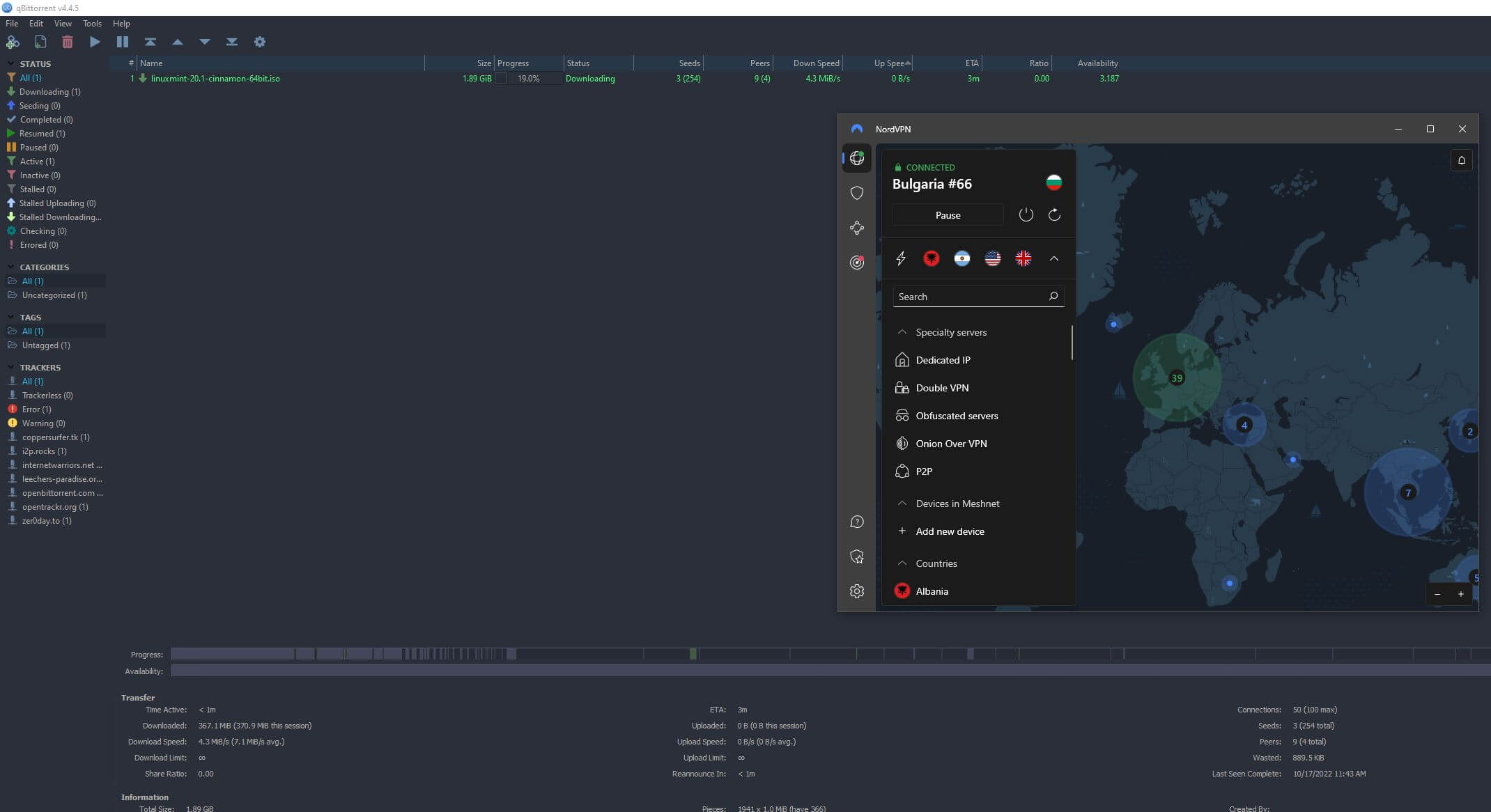
What about PIA? Well, the situation is the same. When using this provider, I was able to download the same copyright-free file with no issues, alas, with a bit more noticeable speed decrease. Still, the decrease was very small, so I can’t say that PIA is a bad choice for this purpose.
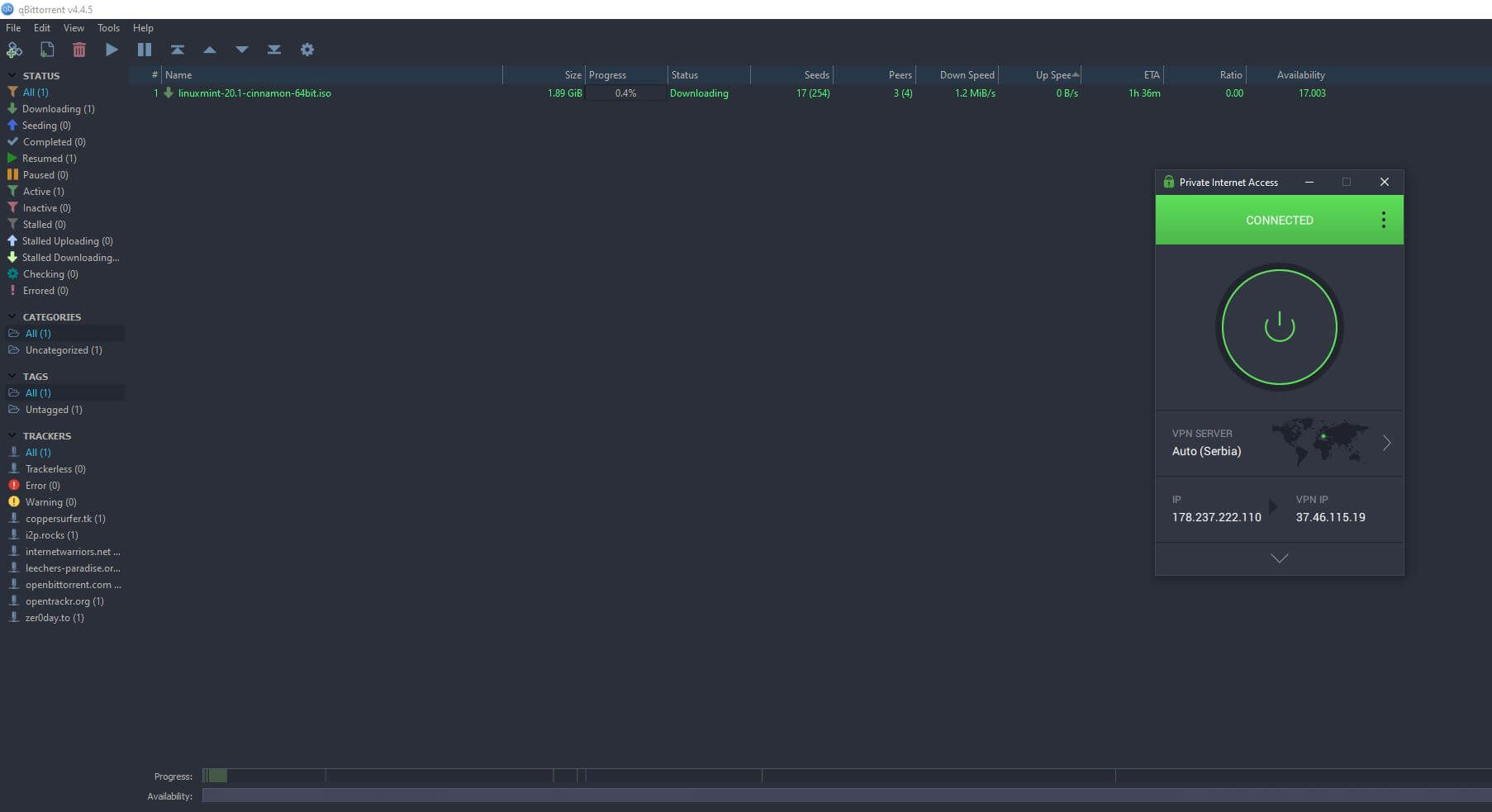
In fact, it’s very reliable, and with stable connections, you can enjoy fast torrent downloads when using the closest server and WireGuard.
Who Wins?
Having in mind that both VPNs showed excellent results in the torrenting comparison, with NordVPN being slightly faster, NordVPN WINS this round. Both providers are solid choices for P2P, although you can try ExpressVPN for even better performance.
Are NordVPN and PIA Working in China?
If you’re looking for a VPN to bypass censorship, which one should you pick – PIA, NordVPN, or neither of them? In this PIA vs NordVPN analysis, I will answer this question and tell you which is a better VPN for traveling to China or simply living in this country.
Unfortunately, Private Internet Access isn’t going to work in this country, despite all of its advanced settings and features. Our testers in China used it and they tried tinkering with the protocols, DNS settings, Multi-Hop, and even obfuscation, but to no avail.
NordVPN, on the other hand, shows impressive results in China. It does have obfuscated servers, which, when enabled, will allow you to bypass The Great Firewall with ease. Even better is the fact that the provider works in this country even without enabling obfuscated servers.
Simply put, it works flawlessly and with no issues, unlike PIA which currently isn’t usable inside the Chinese borders.
Who Wins?
Judging by everything I said, we can easily draw a conclusion. NordVPN WINS this round by working well in China as opposed to its rival that fails to deliver on this front.
NordVPN vs Private Internet Access: Server Fleets Comparison
Having a big server fleet guarantees no overcrowding and sometimes, indicates how capable a VPN is of bypassing geo-restrictions. However, bypassing geo-blocks isn’t entirely dependent on the size of the server network, but the number of IP addresses you can get actually is.
NordVPN (5,600+ servers in 60 countries)
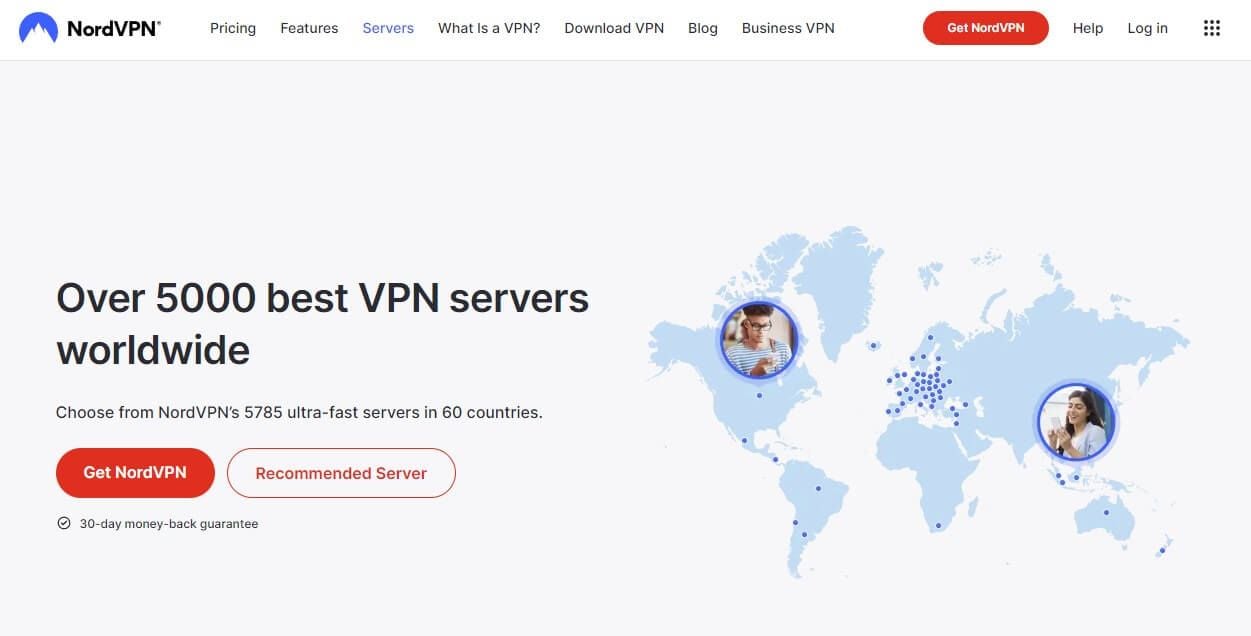
NordVPN has a whopping 5,600+ servers in 60 or so countries, which is, for me, pretty impressive. The server distribution is excellent and I appreciate the variety that the provider brings. You have “normal” servers but also specialty servers for different purposes. These include:
- Obfuscated servers for use in China
- P2P servers for torrenting
- Double VPN servers for doubling your encryption
- Onion Over VPN servers for browsing the dark web
- Dedicated IP, a feature paid additionally on top of your subscription
As you can see, you get 5 types of specialty servers, allowing you to get the most out of this provider. I found all of these servers very useful as well, as NordVPN covers more than 60 countries. Even better is that we’re talking about 10 Gbps servers, which is the newest infrastructure.
This guarantees excellent speeds across the board, making this provider more reliable than its cheaper counterparts. My main complaint is that it covers “only” 60 countries because its main competitors tend to cover more…
Private Internet Access (30,000 servers in 84 countries)
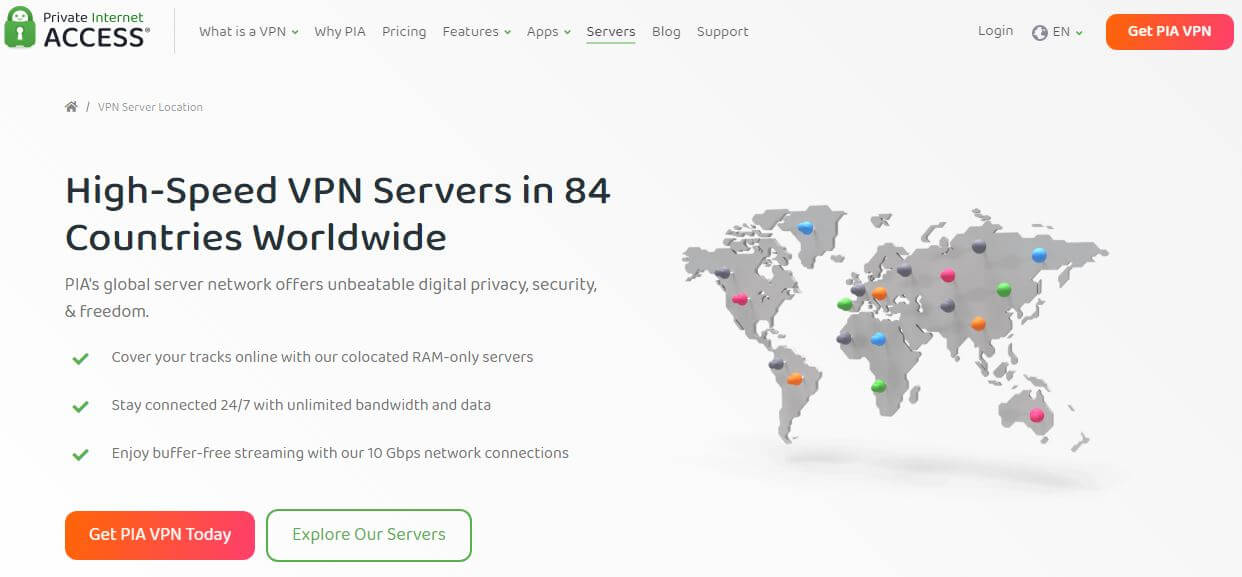
Private Internet Access has nearly 30,000 servers in 84 countries. If you think I’ve added one “0” accidentally, I didn’t. It has 30,000 servers in total, some of which are virtual, and some physically located in particular countries.
PIA doesn’t have a list of specialty servers like NordVPN, but in certain locations, you’ll see which servers are streaming and P2P-optimized. These servers tend to work well for their purposes, albeit, I didn’t manage to unblock Netflix Japan abroad by using a Japanese streaming server.
Nevertheless, PIA VPN is very impressive and its server coverage is par excellence. Covering 24 more countries compared to its rival, it will be easier to change IP and “move” to more exotic countries. Plus, you’re more likely to find a server close to you to maximize your performance.
Another thing to mention is that Multi-Hop has another layer of functionality and you can select the pair of servers manually. Unlike Double VPN in NordVPN, this is a far more useful solution that works better in my experience.
Who Wins?
Even with specialty servers, NordVPN simply can’t beat PIA in terms of server count. With 30,000 servers in 84 countries on offer, Private Internet Access WINS this round hassle-free!
Customer Support of NordVPN & PIA VPN: How to Contact Them?
Encountering issues with your VPN surely feels discouraging, especially when it doesn’t have proper customer support to back you up. That’s how I felt during my review of Windscribe which had a fake live chat widget and a chatbot.
NordVPN and PIA won’t resort to these cheap tricks and both of them offer 24/7 live chat support that doesn’t feel iffy and unresponsive. In fact, I found that they’re crazy fast, and after asking a question, the customer support agent will come to your aid in no more than 30 seconds.
In both cases, I had no issues getting the required help or simply asking a question regarding the number of servers, compatibility questions, and similar. Both providers offer pleasant live chat agents that you can chat with in a friendly manner.
Of course, if you’re shy and you’re not in a hurry, you can always go for email support. Email support is a tad slower but I was surprised to see that I didn’t have to wait for more than 20-30 minutes to get a response, which is pretty impressive.
In a few instances, NordVPN even responded merely 5 minutes after receiving my email. Plus, NordVPN has a YouTube channel with useful videos and shorts, whereas, PIA doesn’t seem to be active on this platform.
Who Wins?
In this NordVPN vs PIA VPN comparison, we can say that NordVPN WINS. Its email support is more responsive and its activity on YouTube is very helpful, unlike PIA which isn’t very active on social media websites.
Pricing Comparison: How Cheap NordVPN & PIA Are?
The final PIA vs NordVPN comparison will have to be one about prices. After all, if you’re on a strict budget, chances are that this is going to be your main criterion when buying a VPN. Luckily, both VPNs are considered affordable, but let’s still compare their prices and see which one is cheaper.
NordVPN
The first one is NordVPN. This provider has a more complex pricing structure compared to PIA which offers just three subscription plans. In NordVPN, you’ll get 3 subscription plans for the 2-year, 1-year, and monthly variants.
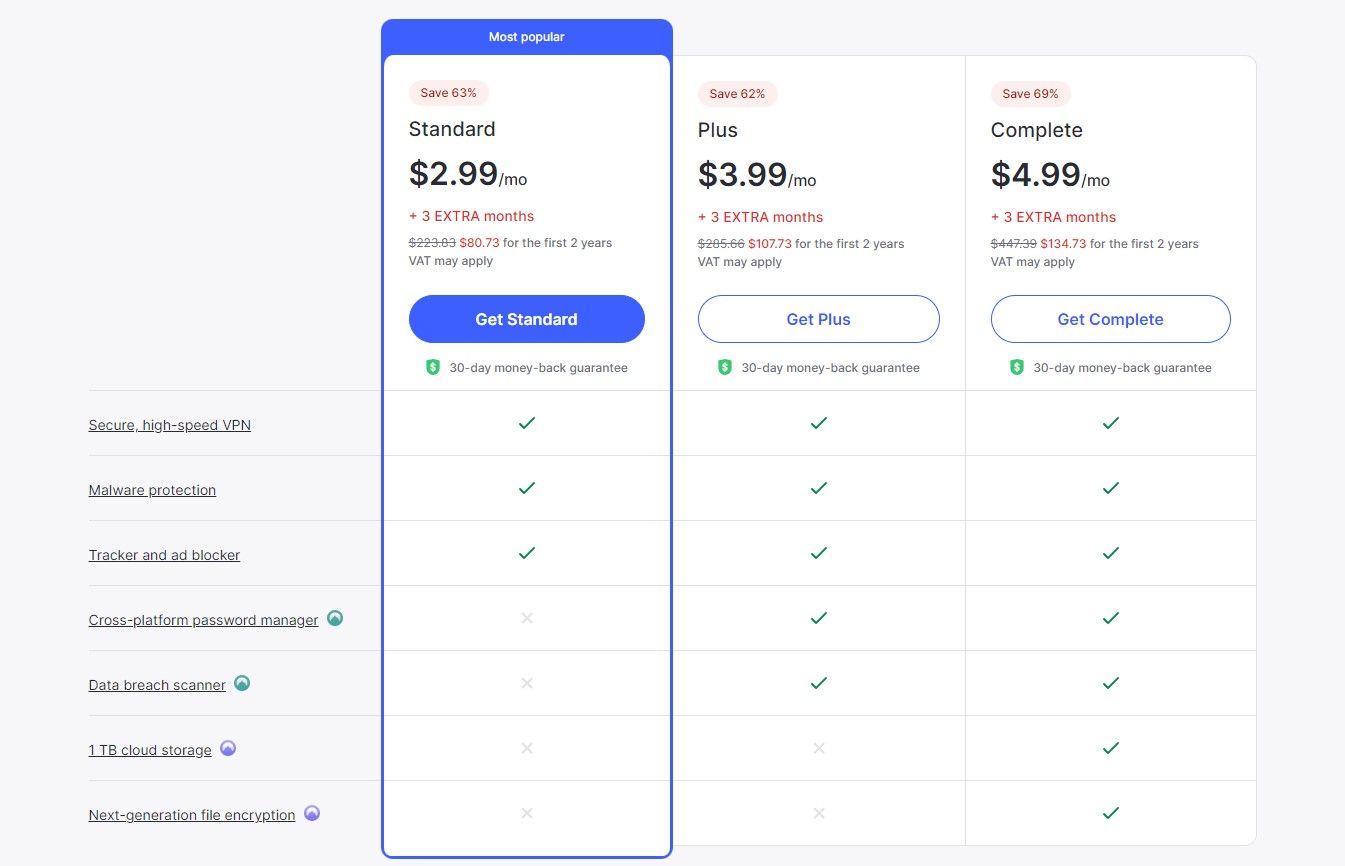
The Standard plan is the cheapest at under $3 a month. This plan gives you all of the features but excludes additions in the form of NordLocker and NordPass. Don’t get us wrong – this is still an excellent deal because none of the VPN-related features are missing.
If you still want the aforementioned add-ons, feel free to get Plus or Complete plans but keep in mind they can be pricey, especially the Complete plans at around $5 a month. This was the 2-year pricing – let’s take a look at its annual prices now.
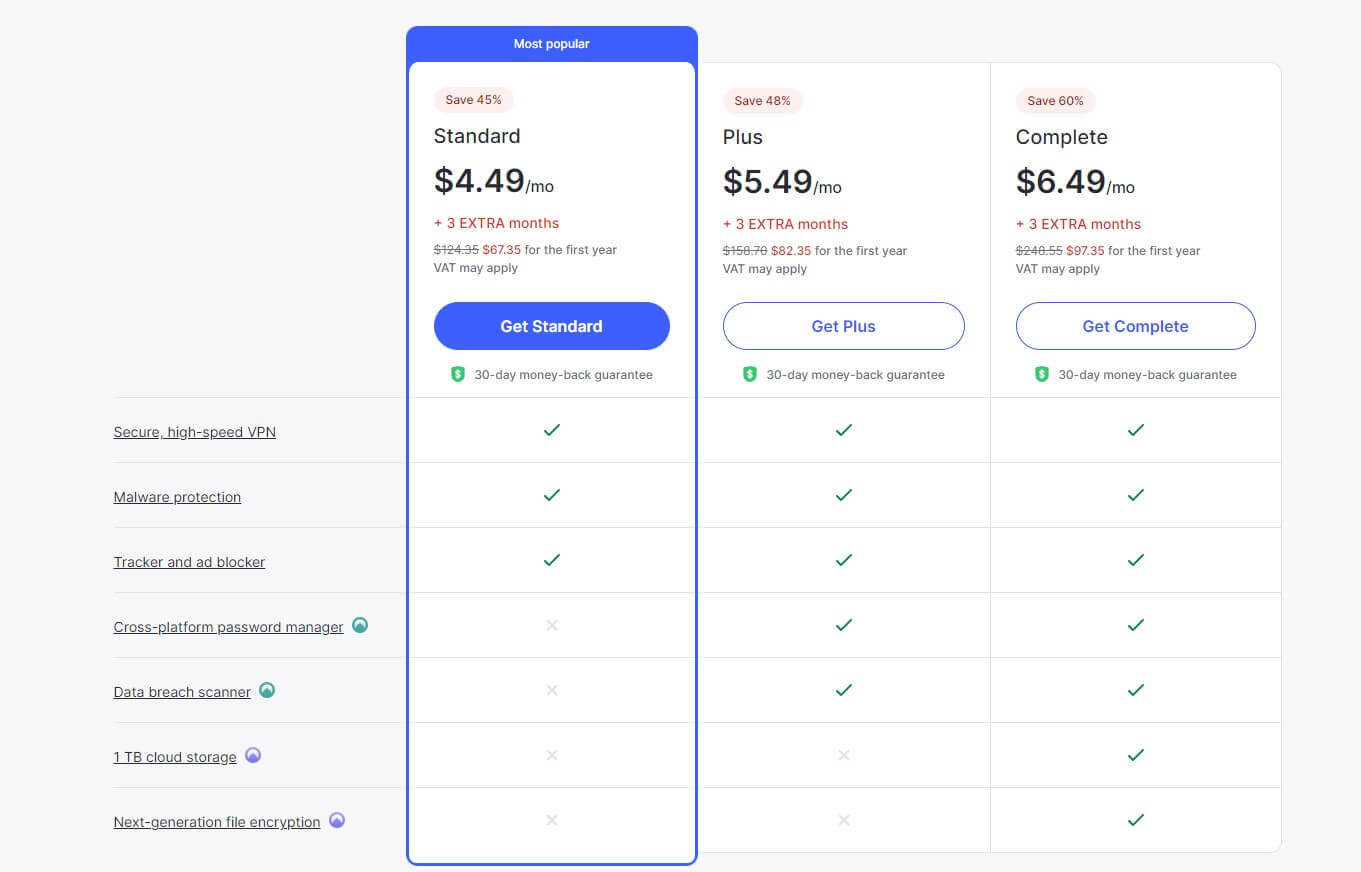
As expected, the prices are now a bit higher. We have the Standard plan at under $4.5 and the Complete plan at a price of well over $6 a month. The annual plan is always more expensive, so it’s nothing strange that you’ll need to pay more in this case.
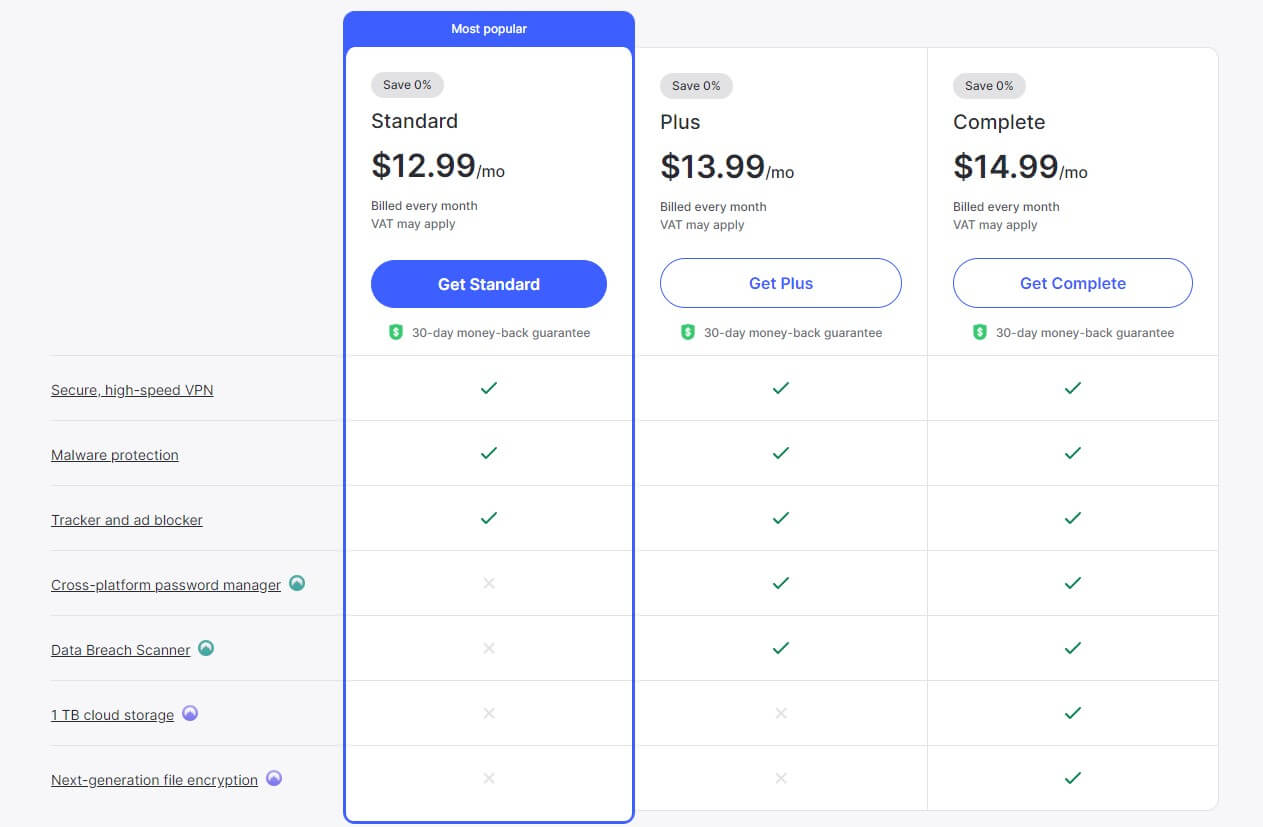
The least favorable is the monthly price of this VPN. We won’t delve deeper into it, as its prices are way too expensive. If you’re paying per month, you’re looking at the price from around $13 to $15, both of which sound ludicrous, although they’re not higher than Surfshark’s monthly prices, for instance.
Still, NordVPN is affordable only if you go for its 2-year plans. Other than that, we can’t call it the most budget-friendly option. Beware that it offers a 30-day money-back guarantee as well, so you can always get a refund in the first 30 days in the case of dissatisfaction, with no specific conditions.
Private Internet Access
With NordVPN’s pricing out of the way, let’s talk about PIA VPN – a provider with a much more straightforward pricing structure.
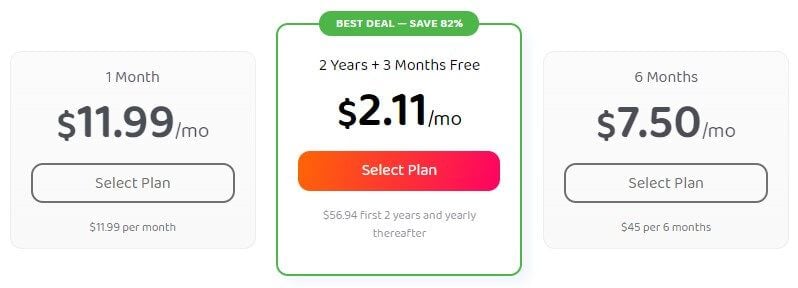
Of course, the provider offers bonus add-ons as well, such as antivirus and dedicated IPs. If you go for the longest plan, an antivirus will cost you less than $1.5 a month on top, with a single dedicated IP being priced at around $2.5 a month.
At the time of writing, PIA includes 500 GB of cloud storage from pCloud in every plan – a pretty nice addition for extending your storage.
Who Wins?
The final comparison between the two providers is maybe the simplest one. From the pricing standpoint, it’s clear that Private Internet Access WINS this round because it’s a lot cheaper and more budget-friendly.
Conclusion: NordVPN Wins!
In the end, we should do the math to determine the winner of this Private Internet Access vs NordVPN comparison for 2025. The final result is 7:4 for NordVPN who is also the winner of this duel.
This provider offers faster speeds and torrenting, better streaming capabilities, more reliable support, and bypassing censorship with ease. On the other hand, PIA is much cheaper and it has significantly more servers while rivaling NordVPN in security/privacy and device support.
The result might say that PIA is significantly worse than its rival and that it isn’t worth getting. However, this isn’t entirely true because we think it’s a really good provider, which, unfortunately, took an L today because it’s paired with one of the best VPNs in the person of NordVPN.
If you’re looking for a cheap and affordable provider and you aren’t very excited about streaming or bypassing censorship, I would advise getting Private Internet Access. But if you want a zero-compromise experience and you don’t mind paying slightly more, NordVPN is definitely a better provider.